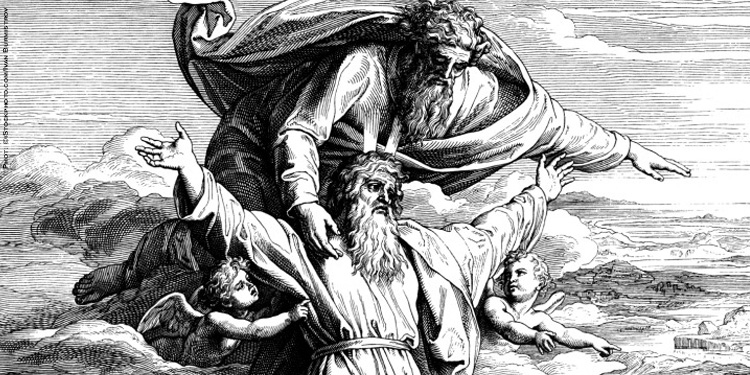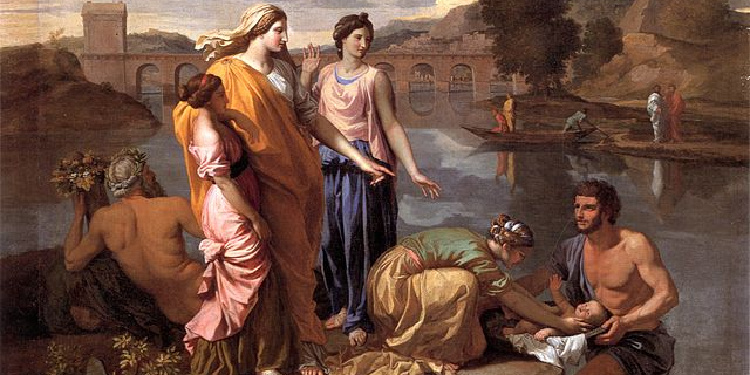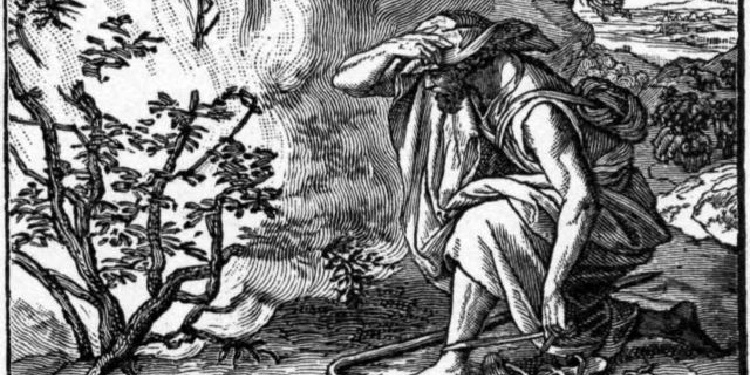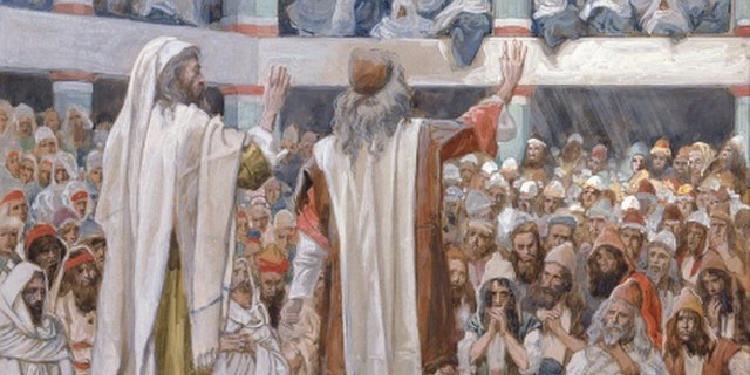Why Did God Choose Moses?
The Fellowship | December 12, 2022

We take it for granted that Moses was chosen to be Israel’s redeemer. But have you ever wondered why God chose Moses?
All we know about Moses’ early life—before he was chosen by God—is that he was raised in Pharaoh’s palace and that he killed an Egyptian who was beating a Hebrew slave. While we can certainly admire Moses’ ability to stand up for what he believed in and to reject a life of royalty for justice and truth, these qualities still don’t explain what God saw in Moses that caused Him to choose this particular man. We can imagine that among the Israelites there were most likely other men and women with similar character traits, including Moses’ brother, Aaron, and his sister, Miriam.
What Set Moses Apart?
A story from the Jewish tradition sheds some light: After killing the Egyptian and running away from Egypt, Moses settled in the desert of Midian, where he became a shepherd. One day, as Moses took his flock to graze, one little lamb ran away. Moses chased the lamb to a brook, far from where he had been.
This was how Moses “came to Horeb, the mountain of God.” When Moses saw the lamb drink thirstily from the brook, he said, “Little lamb, had I known that you were so thirsty, I would have carried you to the water on my own back!” After hearing that, God said, “Moses is worthy of being the leader of my people.”
So, what was Moses’ outstanding quality that made him God’s choice? It was Moses’ willingness to go out of his way to help another creature. It was his willingness to bear a burden for the sake of another. Kindness, not intelligence or ingenuity, is most important to God. And it should be our focus and goal, too.

Photo Credit: Nicolas Poussin | WikiMedia
Growing Up in Royalty
Moses had the unique position of having been raised in Egypt’s royal family as the grandson of the Pharoah. His story begins with Pharoah afraid that the Israelite boys would grow up and revolt against him. In light of his fear, Pharaoh commanded Egypt to kill all male Israelite infants.
Moses was an infant during this time and his mother wanted to save him. She put him in an ark in the river, which was found by Pharaoh’s daughter, Bithiah. Bithiah claimed him as her own son and named him Moses. The name Moses comes from the Hebrew verb that means “to pull out or draw out.” The Hebrew meaning of Moses’ name foreshadows his mission to draw the Israelites out of Egypt.
The desperate act of Moses’ mother was God’s way of sparing they baby’s life from imminent death. Moses was then embraced by the royal family as their own. This adoption into the royal family brought Moses close to Pharoah, making him the perfect choice as God’s messenger to the Egyptian despot.
Education in Egypt
During his time in Egypt, Moses received an education at Heliopolis, a city where thousands of noble adolescents from Egypt and other nations were educated. The Christian Bible says that “Moses was educated in all the wisdom of the Egyptians and was powerful in speech and action” (Acts 7:22). He would have learned about astronomy, chemistry, mathematics, engineering, music, and art throughout his school years. His high level of education set him apart and contributed to him being a wise leader.
Connection Between Moses and the Pharoah
Moses and Pharoah shared some similarities, despite being the protagonist and the antagonist in the Exodus story. First of all, both men refused to do what God called them to do.
In God’s first interaction with Moses, God appeared in the Burning Bush, telling Moses to be his messenger to Pharoah (Exodus 3:10).
Moses originally had four objections, asking God to choose someone else. Moses felt that he was not the right person to bring the Israelites out of Egypt. Despite this refusal, God’s choice of Moses as His holy messenger never wavered.
Similarly, God commanded Pharaoh to let the Israelites go. However, Egypt’s ruler refused time and time again. Throughout the Ten Plagues God sent, Pharoah stubbornly refused to free the Israelites. In each case—with Moses and with Pharoah—God was determined to have these men carry out His demands. But despite countless objections, God did whatever it took for His will to be done.
But there were also key differences between Moses and Pharoah. Pharaoh sat in a place of power—perhaps the most powerful man on earth at the time—while Moses hid in exile after escaping the death penalty for his crime. He came from a place of inferiority, and served as the spokesperson for a group of slaves, begging for the Israelites’ freedom.
Living 40 Years in the Wilderness
During his time in exile, Moses spent 40 years in Midian and married a woman named Zipporah. Moses worked as a shepherd for his father-in-law Jethro, tending to the family flock. Again, God was preparing Moses to lead the Israelites—being a shepherd taught Moses humility, as well as how to lead.

Photo Credit: Charles Foster | Wikimedia
Shepherds lead sheep to water and green pastures. They also protect the sheep from harm and outside threats. The nation of Israel would need someone like this to lead them to their homeland. Someone who could provide food, water, and safety as they trekked toward greener pastures.
Fulfilling Prophecy
Moses freeing the Israelites from Egypt was prophesied in the book of Genesis. In Genesis 15:13, God tells Abraham, “Know for certain that your descendants will be strangers in a country not their own, and they will be enslaved and mistreated four hundred years. But I will punish the nation they serve as slaves, and afterward they will come out with great possessions.” (Genesis 15:13-14).
God’s words are brought to life 400 years later just as He said. Moses brings the Israelites out of Egypt after 430 years of enslavement:
“Now the length of time the Israelite people lived in Egypt was 430 years. At the end of the 430 years, to the very day, all the LORD’s divisions left Egypt. Because the LORD kept vigil that night to bring them out of Egypt, on this night all the Israelites are to keep vigil to honor the LORD for the generations to come.” (Exodus 12:40-42)
These verses reveal the fulfillment of the prophecy from Genesis in which God told Abraham that his descendants would be slaves but would then be freed. Moses was pivotal in carrying out this mission as a servant of God.
Why Moses Instead of Aaron?
In the story of Exodus, Aaron does most of the speaking on behalf of Moses and God. It is said that Moses complained that he was unable to speak well and lacked confidence in his communication skills. So, God appointed Aaron to speak for him. This leads us to the question, why didn’t God choose Aaron to lead the nation of Israel?

Photo Credit: James Tissot | Wikimedia
The answer lies in Exodus 32. When Moses was speaking with God on Mount Sinai, the Israelites in the camp became restless and demanded that Aaron “make us gods who will go before us” (Exodus 32:1). Aaron gave in to the people and melted their gold jewelry into a golden calf. The Israelites began to worship the idol and attributed all of God’s works to it. Aaron also created an altar and proclaimed a feast day. This action was a huge leadership failure on his part. His actions made God angry. God was so angry that He even threatened to destroy the people in response. This story shows that Aaron was weak and incapable of leading the Israelites. Moses was a strong leader who didn’t stray from God, even when the people he was leading—God’s people—grew restless.
Characteristics of a Leader
Moses had all of the right characteristics and was the perfect fit as a leader. He was humble, empathetic, faithful, and a hero for the Jews. He also had both patience and wisdom, and was introspective in his thoughts. God recognized these traits, which are called out throughout the Bible.
In the book of Numbers, Moses’ humility is specifically called out: “Now Moses was a very humble man, more humble than anyone else on the face of the earth” (12:3). A humble leader is exactly what the Jewish nation needed at this time. Enslaved and struggling to survive, they needed someone to radically change their lives, someone who would listen to their needs, someone who would work with them and feel compassion for their situation. Moses was that person. He fulfilled the needs of those he led and answered their questions with God at his side. He helped free them from their bondage and led them to greener pastures with hope for a new life.
In Numbers, God speaks to Aaron and describes Moses as His faithful servant:
“When there is a prophet among you,
I, the Lord, reveal myself to them in visions,
I speak to them in dreams.
But this is not true of my servant Moses;
he is faithful in all my house.
With him I speak face to face,
clearly and not in riddles;
he sees the form of the Lord.
Why then were you not afraid
to speak against my servant Moses?” (12:6-8)
This is yet another example of why God chose Moses. Moses remained faithful to God throughout all of his struggles and fears. He wholeheartedly trusted God and in turn he was chosen to lead the Israelites.
Discover More Resources
Learn more about Moses, Israel, and the Old Testament in our Learning Center. Explore our workbooks, Jewish holiday articles, and devotional guides.
